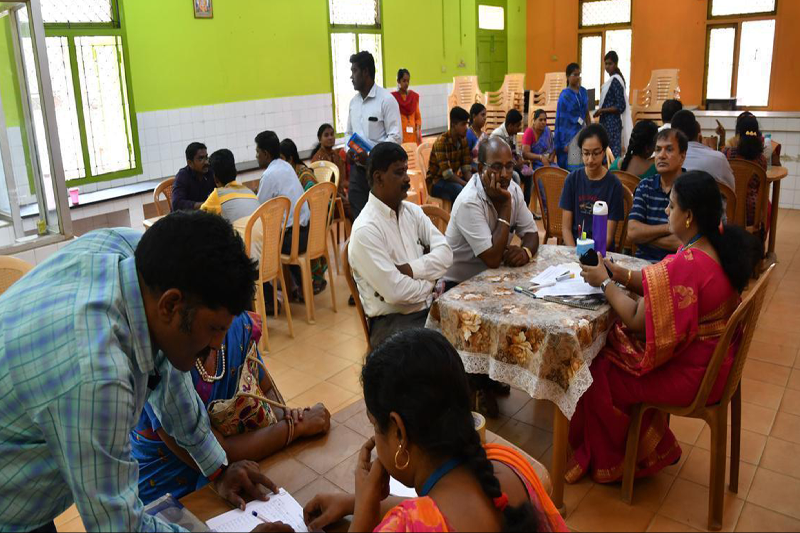
Engineering Counselling in Tamil Nadu: Nearly 4,000 Students Get Choices Wrong, Raising Concerns Over Online Admission Process
The online engineering counselling process in Tamil Nadu has again come under the spotlight after data revealed that nearly 3,995 students received seat allotments far below their expected ranks this year. This marks a sharp increase of about 100% compared to last year, when 1,665 students got their choices wrong. The issue has raised questions about the online counseling system's transparency, efficiency, and fairness, sparking demands from experts and educational consultants for urgent reforms.
What Went Wrong in the Counselling Process
According to data from the Tamil Nadu Engineering Admissions (TNEA) committee, the mismatch between student rank and seat allotment primarily arose because of:
- Tough competition among candidates for top colleges.
- Lack of awareness among students about making adequate choices.
- Some colleges and intermediaries adopt unfair practices.
- The limitations of the online counselling process compared to the earlier single-window system.
Experts noted that many students restricted the number of college options they selected, while others relied on third-party browsing centres, where choice orders were sometimes manipulated for profit.
Breakup of the Allotments Across Rounds
The three rounds of counselling conducted this year revealed the scale of the problem:
- Round 1: 994 students who had missed out initially were allotted seats in the second round.
- Round 2: 2,991 students got their allotments only in the third round.
- Round 3: Concluded this week, with 1.3 lakh engineering seats filled in general counselling.
The data highlights that students with much higher ranks were forced to accept seats in colleges and courses significantly below their merit position.
High-Ranking Students Affected
One of the most alarming findings was that 166 students who scored above 190 marks in the rank list (placing them in the top category) were allotted seats only in the second round. Ironically, the second round was intended for students with marks in the 179–143 range, making the allotments highly disproportionate.
This mismatch has caused widespread disappointment among meritorious students, with many questioning the system's integrity.
Expert Opinions and Suggestions for Reform
Prominent career consultant Jayaprakash Gandhi expressed serious concerns, pointing out that the counselling framework needs urgent revision. He suggested two possible solutions:
- Increasing the number of counselling rounds from three to four accommodates students who missed out on earlier choices.
- Returning to the single-window counselling system, where admissions were strictly rank-based and sequential, leaving little room for discrepancies.
Gandhi stressed that the current online system has created space for confusion and malpractice, particularly when students are unaware of how to maximize their options.
The Case for the Single-Window Counselling System
Educational consultant D. Nedunchezhian also criticized the existing mechanism, noting that students with high scores were admitted to low-ranked colleges due to flawed allotments.
He recalled that the single-window system, introduced by former Chief Minister M. Karunanidhi, was the most transparent process. In that model:
- A student ranked 502nd could only choose after the 501st student had selected their seat.
- This ensured that every allocation was purely merit-based and sequential, eliminating manipulation.
Nedunchezhian argued that the current online system, which depends on the order of choice entered online, fails to protect the interests of high-ranking students.
Allegations of Unfair Practices by Colleges
Adding to the concerns are allegations that some colleges manipulate the process to boost their admissions. Professors and experts claim that certain browsing centres and middlemen, often tied to colleges, have influenced students' choice order.
By restricting or altering the order of preferences, these actors can channel students into less-preferred institutions, filling vacancies in lower-ranked colleges at the expense of merit.
The Official Stand
Despite these concerns, Tamil Nadu Engineering Admissions (TNEA) committee officials maintained that the process has not received significant complaints. They argue that the system is efficient mainly and that grievances are relatively minor compared to the large number of successful admissions.
While the official stance projects confidence in the system, the stark data and expert testimonies suggest a growing trust deficit among students and parents.
The Bigger Picture: Student Awareness and Counselling Support
One recurring theme in this issue is students' lack of awareness about how to navigate the online counselling process. Many students did not provide a wide enough set of choices, assuming their rank would automatically secure a seat in a top college. Others relied on intermediaries, exposing themselves to manipulation.
Experts believe better counselling guidance and awareness drives are essential to prevent such errors. Students should be trained to fill in multiple-choice questions strategically, while parents should be aware of potential malpractices.
Conclusion
The revelation that nearly 4,000 students in Tamil Nadu made incorrect counselling choices in 2025 highlights the urgent need for reform in the state’s engineering admission system. The situation not only undermines student confidence but also calls into question the fairness of an online process intended to be transparent and efficient.
Experts are united in calling for improvements — whether by expanding the number of counselling rounds or returning to the proven single-window model. At the same time, curbing unfair practices and raising awareness among students remain critical to ensuring that merit truly determines admissions.
Until such measures are implemented, the risk of talented students ending up in undesired colleges will persist — a troubling outcome for both students and the future of engineering education in Tamil Nadu.



